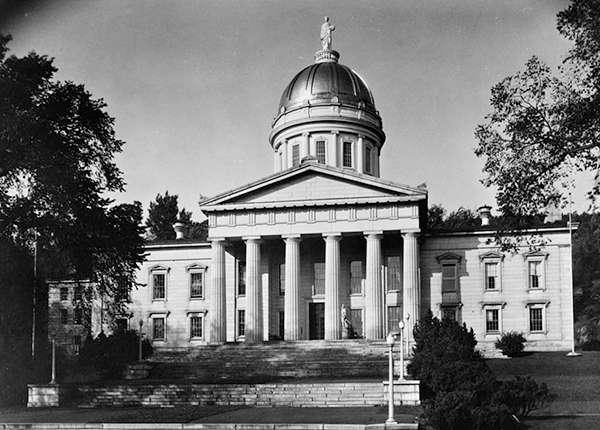Historic Document
An Act Relating to Civil Unions (2000)
Vermont | 2000

Library of Congress, Prints and Photographs Division, HABS
Summary
In Baker v. Vermont (1999), the Vermont Supreme Court ruled that the exclusion of gay and lesbian couples from marriage licenses under the state’s marriage laws violated the Common Benefits Clause of the state constitution. The court ruled that the state must either allow such couples equal access to marriage, or create an equivalent legal protection. After an acrimonious public debate among a divided citizenry, the state legislature enacted the following statue in 2000, and Governor Howard Dean signed it into law.
Selected by

Christopher Brooks
Professor of History, East Stroudsburg University

Kenneth Mack
Lawrence D. Biele Professor of Law, Harvard Law School
Document Excerpt
- 91. AN ACT RELATING TO CIVIL UNIONS (H.847)
It is hereby enacted by the General Assembly of the State of Vermont:
Sec. 1. LEGISLATIVE FINDINGS
The General Assembly finds that:
(1) Civil marriage under Vermont’s marriage statutes consists of a union between a man and a woman. This interpretation of the state’s marriage laws was upheld by the Supreme Court in Baker v. State.
(2) Vermont’s history as an independent republic and as a state is one of equal treatment and respect for all Vermonters. This tradition is embodied in the Common Benefits Clause of the Vermont Constitution, Chapter I, Article 7th.
(3) The state’s interest in civil marriage is to encourage close and caring families, and to protect all family members from the economic and social consequences of abandonment and divorce, focusing on those who have been especially at risk.
(4) Legal recognition of civil marriage by the state is the primary and, in a number of instances, the exclusive source of numerous benefits, responsibilities and protections under the laws of the state for married persons and their children.
(5) Based on the state’s tradition of equality under the law and strong families, for at least 25 years, Vermont Probate Courts have qualified gay and lesbian individuals as adoptive parents.
(6) Vermont was one of the first states to adopt comprehensive legislation prohibiting discrimination on the basis of sexual orientation (Act No. 135 of 1992).
(7) The state has a strong interest in promoting stable and lasting families, including families based upon a same-sex couple.
(8) Without the legal protections, benefits and responsibilities associated with civil marriage, same-sex couples suffer numerous obstacles and hardships.
(9) Despite longstanding social and economic discrimination, many gay and lesbian Vermonters have formed lasting, committed, caring and faithful relationships with persons of their same sex. These couples live together, participate in their communities together, and some raise children and care for family members together, just as do couples who are married under Vermont law.
(10) While a system of civil unions does not bestow the status of civil marriage, it does satisfy the requirements of the Common Benefits Clause. Changes in the way significant legal relationships are established under the constitution should be approached carefully, combining respect for the community and cultural institutions most affected with a commitment to the constitutional rights involved. Granting benefits and protections to same-sex couples through a system of civil unions will provide due respect for tradition and long-standing social institutions, and will permit adjustment as unanticipated consequences or unmet needs arise.
(11) The constitutional principle of equality embodied in the Common Benefits Clause is compatible with the freedom of religious belief and worship guaranteed in Chapter I, Article 3rd of the state constitution. Extending the benefits and protections of marriage to same-sex couples through a system of civil unions preserves the fundamental constitutional right of each of the multitude of religious faiths in Vermont to choose freely and without state interference to whom to grant the religious status, sacrament or blessing of marriage under the rules, practices or traditions of such faith.
* * *
For a civil union to be established in Vermont, it shall be necessary that the parties to a civil union satisfy all of the following criteria:
(1) Not be a party to another civil union or a marriage.
(2) Be of the same sex and therefore excluded from the marriage laws of this state.
* * *
1204. BENEFITS, PROTECTIONS AND RESPONSIBILITIES OF
PARTIES TO A CIVIL UNION
(a) Parties to a civil union shall have all the same benefits, protections and responsibilities under law, whether they derive from statute, administrative or court rule, policy, common law or any other source of civil law, as are granted to spouses in a marriage.”




